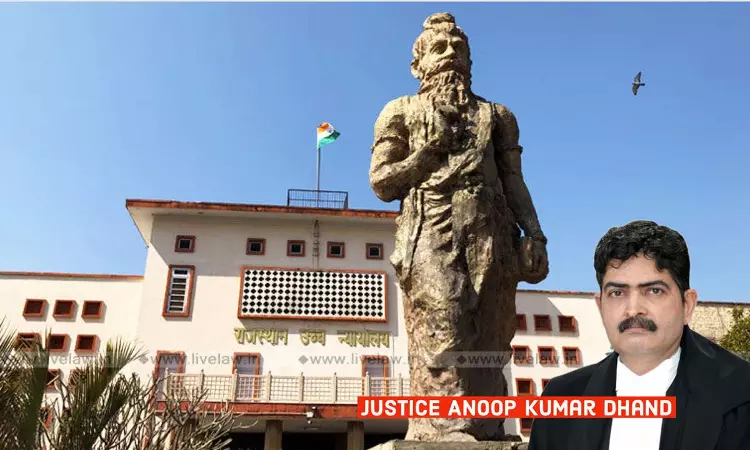- Home
- /
- High Courts
- /
- Rajasthan High Court
- /
- Govt Cannot Indefinitely Postpone...
Govt Cannot Indefinitely Postpone Panchayat Elections, Contrary To Article 243-E Of Constitution: Rajasthan High Court
Nupur Agrawal
21 Aug 2025 1:30 PM IST
The Rajasthan High Court held that removing formal Sarpanch(s) who were allowed to hold the post of Administrators till next elections even after expiry of more than 6 months of dissolution of their respective panchayats, without following the procedure established by law for holding fresh Panchayat elections, was a glaring example of violation of a constitutional mandate.The bench of...
The Rajasthan High Court held that removing formal Sarpanch(s) who were allowed to hold the post of Administrators till next elections even after expiry of more than 6 months of dissolution of their respective panchayats, without following the procedure established by law for holding fresh Panchayat elections, was a glaring example of violation of a constitutional mandate.
The bench of Justice Anoop Kumar Dhand further opined that prolonged postponement of these elections could result in a governance vacuum at the local level, and it was expected of the Government of Rajasthan to look into the matter promptly to ensure that the elections of the Panchayati Raj Institutions were conducted at the earliest.
“Government cannot postpone the entire election process of the Panchayati Raj Institutions indefinitely, contrary to the mandate contained under Article 243-E of the Constitution of India and Section 17 of the Act of 1994. The entire exercise of delimitation should have been completed prior to the expiry of the term of the Panchayats or within six months of the dissolution of these Panchayati Raj Institutions.”
The Court was hearing a bunch of petitions challenging the orders of removal of petitioners from the post of Administrators, passed without conducting any enquiry required under Rule 22 of the Rajasthan Panchayati Raj Rules, 1996 (the “Rules”).
After completion of petitioners' tenure as Sarpanch, they were appointed as Administrators to manage the day-to-day affairs of the respective gram panchayats, till the time new panchayats were elected. A notice was issued against the petitioners, levelling multiple charges, and without conducting any enquiry or affording an opportunity of hearing, they were removed from the post.
It was argued by the counsel for the State that the petitioners' appointment as administrators was a stopgap arrangement, and hence, the circular/notice notifying their appointment did not have statutory force, and since no statutory position was held by them, it was not required to follow the prescribed procedure.
Further, it was submitted that an appropriate enquiry shall be conducted against the petitioners at this stage, after they have been removed.
After hearing the contention, firstly, the Court rejected the argument of the State that since the petitioners were not holding any statutory position, they had no right to file this petition. It was held that the petitioners were allowed to continue by virtue of provisions of law which did not have any statutory force.
All the petitioners were removed under Section 38 of the Rajasthan Panchayati Raj Act, 1994 (the “Act”) that dealt with removal or suspension of any member of the Panchayati Raj Institution in case found guilt of misconduct or disgraceful act. However, in the present matter, the petitioners were removed without getting any opportunity of hearing.
Further, on the argument of the enquiry being conducted post-facto, the Court opined that, “the respondents have pre-determined to impose the order of removal on the petitioners and thereafter, proceeded to hold enquiry, giving only a post-decisional opportunity of hearing which does not subserve the rule of natural justice and is contrary to the principles of fair play”.
In this background, since the prescribed procedure was not followed by the State, the Court set aside all the orders of removal of the petitioners.
Further, it observed that,
“In case of persistent failure & delay to conduct election process of the Panchayati Raj Institutions, it is incumbent upon the State Election Commission or the Election Commission of India to intervene and take necessary measures to restore the democratic process. Prolonged postponement of these elections can result into a governance vacuum at the local level, adversely affecting the delivery of services and developmental activities at the grass root level.”
Expressing hope and trust on the Government of Rajasthan to look into the matter and ensure that the elections of Panchayati Raj Institutions were conducted at the earliest, the Court directed the order's copy to be sent to the Election Commission of India and the State Election Commission.
Accordingly, petitions were allowed.
Title: Mahaveer Prasad v State of Rajasthan & Ors., and other connected petitions
Citation: 2025 LiveLaw (Raj) 281



